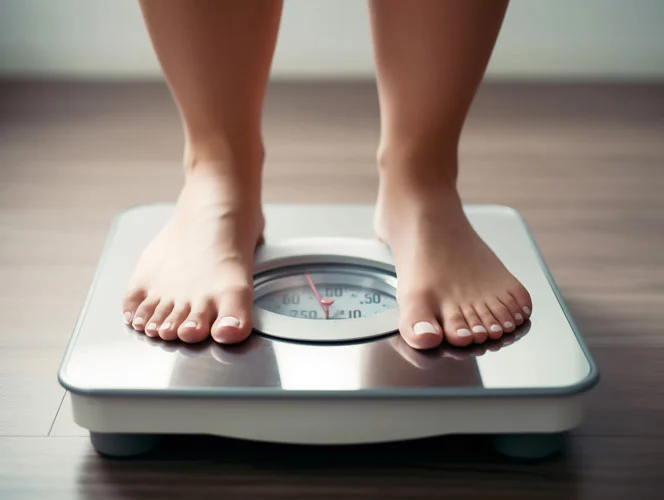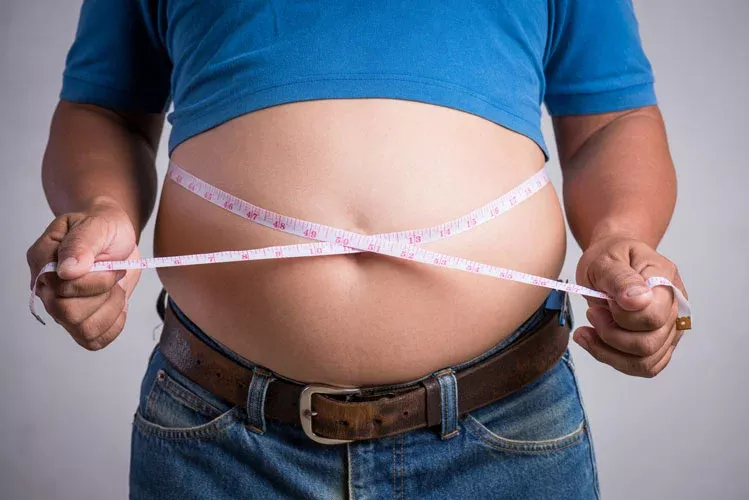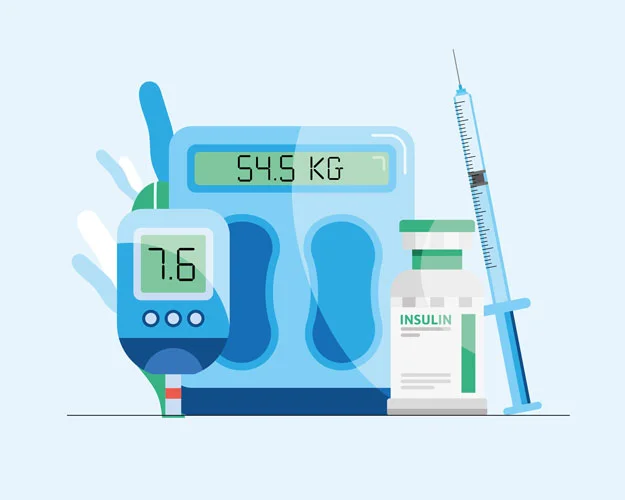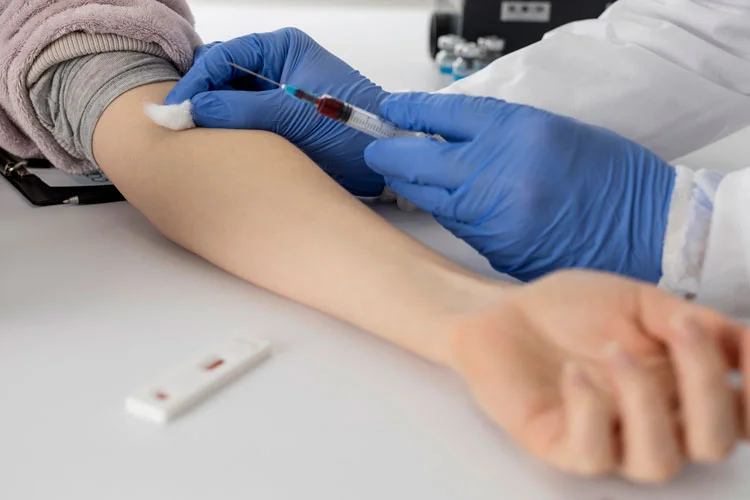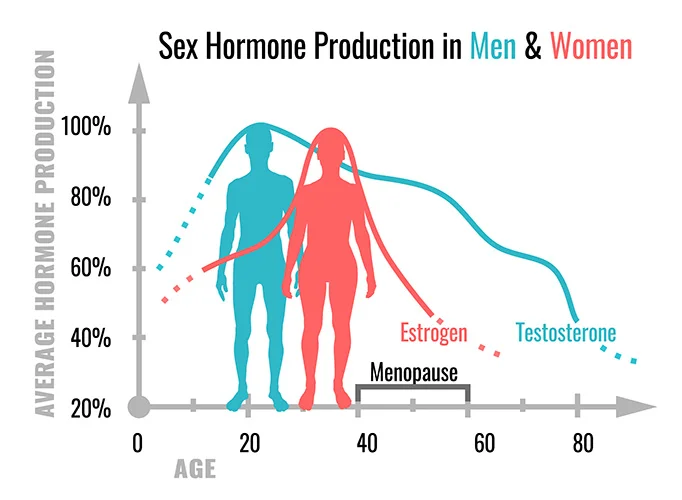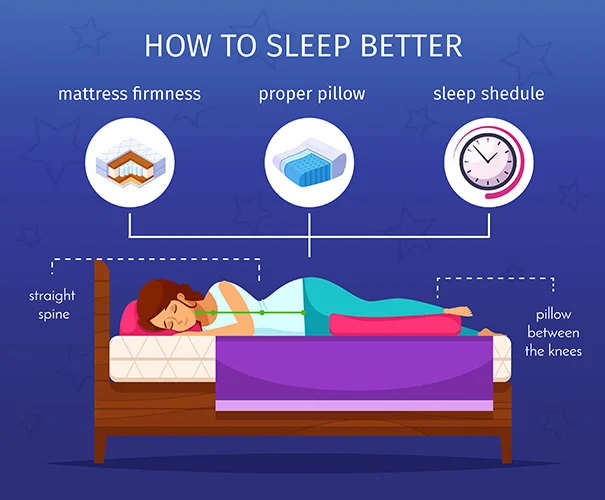Are you gaining weight despite the diets and workouts? Your hormones may be to blame for it. Generally, calories would be blamed for the weight gain. But when there is a hormone imbalance, more factors are in play, causing weight loss resistance.
According to Harvard-educated physician-scientist and New York Times best-selling author, Dr. Sara Gottfried, MD, hormones are responsible for 99% of weight loss resistance.
Hormonal imbalance can have a significant impact on the weight loss journey. Besides that, it also affects our mood and happiness.
This article demystifies 7 specific hormones, both male and female, that prevent weight loss. Also, you will learn the common symptoms of hormonal weight gain and effective tips on how to shed the pounds brought on by hormonal imbalances.
Can Hormones Make You Lose Weight?
Hormones are responsible for metabolism, blood sugar control, and insulin balance. And hence they can influence weight gain or loss. When your hormonal imbalance occurs, it can affect your weight leading to fluctuations. The hormonal changes also influence your appetite causing your body to store more fat, sometimes less.
In short, Yes! The right balance of hormones can help you lose weight.
Do Female Hormones Affect Weight Loss?
Hormones contribute to the function of many crucial functions within your body. A few of those are regulating stress, hunger, losing body fat, and maintaining muscle. A hormone imbalance can put your weight loss in jeopardy, making it harder to lose weight. For example, estrogen, the female sex hormone, can cause weight gain when high or low.
7 Hormones Preventing Weight Loss
Hormones are chemical messengers that are responsible for a variety of functions, including:
- Control of growth
- Development of sex organs
- Regulating blood sugar levels
- Affecting body weight, muscle mass, and body fat
It is safe to say that hormones have a massive impact on weight loss. The reason being hormone levels vary due to age factors, stress, puberty, mensuration, and pregnancy, to name a few. The change in levels can have an adverse effect on your health.
Here are the hormones that may hinder your weight loss efforts.
Thyroid
The thyroid is a butterfly-shaped gland present in the front of your neck. It produces two hormones: triiodothyronine (T3) and thyroxine (T4). Thyroid hormones regulate everything from metabolism to growth and are also responsible for regulating your heartbeat. They also dictate how fast or slow you burn calories. The deficiency of the hormone can slow down every organ of your body.
As per the National Institute of Health (NIH) report, 5% of Americans aged 12 and older have hypothyroidism. The same study also reports that women are more prone to hypothyroidism than men. When your body cannot produce enough thyroid hormones, the metabolic rate slows down, causing weight gain. Hypothyroidism is also the reason for dry skin and hair, hair loss, brain fog, fatigue, and intolerance towards cold temperatures, to name a few.
Also, 1.2% of Americans have hyperthyroidism, where the thyroid gland secretes excess thyroid hormones. In this case, the metabolic rate increases, leading to dramatic weight loss.
People with low thyroid hormones will face difficulty losing weight due to reduced metabolism and fatigue. However, when the thyroid levels are restored, the weight loss becomes easier and achievable.
Cortisol
Otherwise known as the “stress hormone”, adrenal glands release cortisol in times of stress. During stress, your body goes into fight or flight mode, ramping up the production of adrenaline (epinephrine), noradrenaline (norepinephrine), and cortisol.
While cortisol is vital to your survival, an excess of the stress hormone can lead to overeating and weight gain. High cortisol levels are also linked to anxiety, depression, obesity, increased appetite, muscle loss, and belly fat. People with chronic stress levels tend to have high cortisol levels.
Having said that, cortisol is essential for survival. But elevated levels lead to muscle breakdown, increase in blood sugar, and reduced-fat burning. When this happens, your body goes into survival mode and starts to store fat. Furthermore, high cortisol levels also increase food intake leading to excessive weight gain.
Unlike the other hormones, cortisol imbalance requires a lifestyle change. It would be best to reduce your stress via yoga, meditation, sleep, or any other hobby you may enjoy. A healthy diet and proper sleep can also help to bring down cortisol levels.
Insulin
Produced by the beta cells of the pancreas, insulin regulates blood sugar. It is secreted as a response to the increase in blood sugar levels in the body. It signals the cells to absorb the nutrients (blood sugar/glucose) stored in muscle and fat cells. In muscle, the glucose is burned for energy or stored as glycogen. On the other hand, fat cells store the excess as fat.
People with obesity tend to have reduced insulin sensitivity. As the insulin imbalance progresses, the excess calories from sugar-laden food initiate insulin resistance. When this happens, your cells are unable to absorb the excess sugar. Your liver then converts them into fat resulting in weight gain. Insulin resistance is the key symptom of type 2 diabetes.
According to a report by WHO, diabetes is responsible for the deaths of 1.5 million people worldwide in 2019. In addition, people with high insulin levels are also susceptible to stroke and cardiovascular disease. Apart from that, there is also the risk of foot ulcers, infection, diabetic retinopathy, and renal (kidney) failure.
Losing weight is the only way to improve insulin sensitivity. You can improve insulin sensitivity with a calorie-deficit diet that you can adapt for the long term.
Estrogen
Estrogen is one of the leading female sex hormones, along with progesterone. It is secreted in the ovaries, and the primary function is to manage the female reproductive system. Additionally, it also protects the bones and cardiovascular system, along with aiding in healing. However, too much estrogen causes moodiness, heavy periods, and above all, weight loss resistance.
Estrogen stays in a delicate balance with the other female sex hormone, progesterone. An imbalance in estrogen levels can cause weight gain, more pronounced in the hips and thighs. Overweight adults tend to have higher estrogen levels in the body.
The high estrogen levels induce insulin resistance which in turn causes the blood sugar levels to rise. As a result, you may experience weight gain. On the other hand, low estrogen can also cause you to gain weight. Moreover, estrogen levels tend to reduce with menopause, during which period women gain visceral fat.
However, in men, the male body converts testosterone to estradiol, a form of estrogen. Imbalance in estrogen levels can lead to increased belly fat, swollen breast tissue, and more.
Proper diet, exercise, and appropriate calorie intake can help control visceral fat.
Testosterone
Testosterone, otherwise called the male sex hormone, plays an integral part in the growth of male reproductive tissues. Furthermore, it also functions as an anabolic hormone helping to build muscle tone and body mass. The testicles secrete it in men while the ovaries perform the same function at a much smaller level in females.
Testosterone production increases during puberty and decreases in your 30’s. After your 30’s you can see a 5-10% reduction per decade. These low testosterone levels can cause you to gain fat. Apart from that, they also result in low libido, anemia, osteoporosis, or depression. Men with low testosterone also present lower muscle mass and higher levels of visceral fat.
Carrying too much weight (especially belly fat) and not enough sleep is responsible for low testosterone levels. While testosterone treatment can bring a slight weight loss, especially around your belly, it is not enough to reverse obesity.
Leptin
Leptin is a hormone produced by your fat cells. Otherwise called the “satiety hormone,” leptin reduces appetite and makes you feel sated. Furthermore, leptin also helps to regulate blood pressure, blood sugar, and many more.
The increased leptin levels in your body signal the brain to suppress the appetite while increasing the metabolic rate. This action prevents you from overeating.
Obese and overweight people have elevated leptin levels in their bodies. This is due to leptin resistance, where their brain doesn’t respond to the high leptin. As a result, they are hungry even though they have adequate fat stores.
However, when you lose body fat, the leptin levels reduce, which signals appetite followed by a reduction in metabolism. This hinders weight loss since it tricks your brain into believing that you are starving. Hence, you are pushed into overeating.
Continued elevated insulin levels and inflammation in the brain are the most important reasons for leptin resistance. However, with a balanced diet and enough sleep, you can improve leptin sensitivity. Here are a few expert suggestions:
- Stay away from inflammatory foods such as sugar and processed foods (containing trans fats).
- Eat more anti-inflammatory foods such as fatty fish.
- Improve your quality of sleep. An adult requires 7-8 hours of sleep per day.
- Daily moderate levels of exercise.
Ghrelin
Otherwise called the “hunger hormone”, ghrelin is secreted in the stomach and small intestine, with just a small portion of the hormone released in the pancreas and brain. It is also central to stimulating appetite and the release of growth hormones. This hormone plays a vital role in the hypothalamus, the part of the brain that controls appetite, and may also stimulate other regions of the brain that control reward processing. Apart from that, it also helps in moving the food through the digestive tract. Furthermore, ghrelin also plays a significant role in cardiovascular health, mental health, and the immune system.
Generally, ghrelin levels are at their highest when you are hungry and lowest 30 minutes after eating. Interestingly, studies have shown that fasting and even dieting cause ghrelin levels to increase, which explains why research has shown roughly 80% of dieters fail to keep the weight off permanently. Even after eating, the levels do not show a significant decrease. As a result, the brain doesn’t receive the necessary signal to stop eating, thus driving eating disorders such as bingeing.
Sugar can hinder the ghrelin response to a greater extent. Therefore, avoiding sugar and including protein in your meals can help reduce ghrelin levels in your body.
Hormonal Weight Gain Symptoms
Hormones are vital for the overall health of your body and fat loss. Hormonal imbalance may result in numerous health issues, especially weight gain. In females, it is due to the lower levels of estradiol, a specific estrogen hormone. It regulates metabolism and helps maintain body weight. Estradiol reduces at menopause and also contributes to hormonal weight gain, particularly around the thighs and hips.
Meanwhile, in men, weight gain is due to elevated cortisol levels, which is the stress hormone. In times of increased stress, the body goes into survival mode and causes cortisol levels to rise. Meanwhile, there is an increase in the production of fat cells and a decrease in metabolism.
You can see one or more of the following symptoms with hormonal weight gain:
Can Hormonal Imbalance Make it Hard to Lose Weight?
Hormones play a vital role in supporting many critical functions within the body. The most important of them are losing weight, maintaining muscle mass, stress management, and hunger. However, when a hormonal imbalance occurs, losing weight becomes much more complicated. Until you tackle the root cause of the imbalance, weight loss remains difficult.
Having said that, hormones are not the only reason for weight gain. Your calorie intake and lifestyle play an essential part in maintaining a healthy weight. Not only that, but they also create a proper environment for requisite hormone production.
How Do I Lose Weight with Hormonal Imbalance?
Unless the root cause of the hormonal imbalances is treated, it is pretty challenging to maintain weight loss. The key to shedding excess body fat is resetting hormone levels and leading a healthy, stress-free life. Here are a few diet and lifestyle changes that can impact the hormone levels in your body.
Include a Serving of Protein with Every Meal
Generally speaking, you should consume protein every day to provide your body with the essential amino acids. In addition, protein also helps to reduce the ghrelin levels in your body.
As per the Dietary Reference Intake, the daily protein requirement for a sedentary female is 46 grams and 56 grams for men. However, this value is subject to change depending on your activity, muscle mass, health, and age.
Regular Physical Activity
Daily exercises not only influence weight loss but also improves the quality of life. It also reduces the risk of diabetes, hypertension, depression, anxiety, and cardiovascular disease.
According to WHO, an adult requires 150–300 minutes of moderate physical activity per week. This is because regular exercise helps boost hormones that dwindle with age, such as growth hormone and testosterone.
Reduce Stress Levels
Stress can cause severe and extensive damage to the hormones, primarily cortisol. Chronic stress can cause a surge in cortisol levels leading to increased calorie intake and belly fat.
Practice some form of stress-reducing techniques such as meditation and yoga to help reduce the cortisol levels in your body. In addition, people suffering from chronic stress should limit their intake of alcohol and coffee. Alternatively, you can drink green tea and add dark chocolate (80% cocoa) to your routine.
Avoid Sugar and Refined Carbs
Refined carbs and sugar are tied to a host of health issues, not to mention hormonal imbalance. Avoiding or at least reducing the use helps avoid diabetes and obesity, to name a few.
One study reported an increase in insulin levels and insulin resistance in people consuming 50 grams of sugar every day. Another study reported an increased glucose level, insulin level, and ghrelin among type 2 diabetics who consumed a breakfast high in refined carbs.
Increase Healthy Fats
High-quality healthy and natural fats can help lessen insulin resistance and also appetite. For example, MCT or Medium-chain triglycerides present in coconut oil and palm oil help reduce insulin resistance in diabetic people.
Furthermore, the monounsaturated fat in nuts and olive oil also helps improve insulin sensitivity among diabetics and healthy adults. In short, ensure that you consume healthy fats with every meal.
Improve the Quality of Sleep
Poor sleep can increase appetite and cravings resulting in more calorie intake. Furthermore, it is also linked to hormonal imbalances, including insulin, leptin, ghrelin, cortisol, and growth hormones.
Improving the quality of sleep can lower cortisol levels and also help in losing weight. A study on helicopter pilots with reduced sleep (6hrs or less) reported increased cortisol levels at 80%. The levels stayed elevated for two days post-duty.
Another study analyzed the effects sleep restriction had on men. The men slept 5 hrs per night for seven nights. They showed a 20% decrease in insulin sensitivity.
For a proper hormone balance, you need at least 7 hours of good quality sleep per night.
Daily Supplements
Insulin-resistant people often benefit from magnesium supplements. For example, magnesium can increase insulin sensitivity among type 2 diabetics. Likewise, flaxseed supplements are known to decrease testosterone levels in women.
In the same line, add B vitamins and omega supplements. But first and foremost, get yourself tested for deficiency.
How Do Hormones Change with Weight Loss?
Studies have reported a correlation between excess body fat and increased levels of estrogen and other hormones. Elevated hormone levels also increase breast cancer risk in women.
Another study found that there was a change in estrogen and testosterone levels after weight loss. The same was observed in overweight and obese women.
Do Supplements Help with Hormone Imbalances?
Hormones being a messenger is vital for the proper functioning of the body. Any imbalance can impact every aspect of one’s life. As a result, you experience weight gain and mood swings, trouble sleeping, irritability, and more. One of the tried and tested methods is to regulate the hormones via supplements. Supplements are a great way of balancing your hormones and reducing the symptoms. Apart from that, they also ensure that your endocrine system gets enough nutrients.
- Magnesium is essential for balancing hormones. It is present in food groups, such as green vegetables, legumes, avocado, and dark chocolate. Even then, people with hormonal imbalances may require a supplement.
- B Vitamins are essential for maintaining hormone balance. In addition to eating a healthy diet, you may want to supplement with B vitamins. They help to increase energy levels, improve mood, boost the immune system, and lose weight.
- Omega-3 Fatty Acids are anti-inflammatory and are essential for hormone balance.
- Vitamin D3 communicates with other hormones and helps balance them. Vitamin D supplements help to prevent hormonal imbalances.
- DHEA supplements help the body to produce sufficient estrogen and testosterone.
- DIM supplements help address estrogen imbalance in the body. Moreover, it also improves metabolism and promotes weight loss.
- Pregnenolone supplements help to regulate hormonal imbalance in the body. In addition, they help create other hormones, including cortisol, testosterone, estrogen, and progesterone.
Conclusion
Hormonal imbalances, though scary, subside when the root cause is identified and addressed. Weight gain due to hormonal imbalances opens you to a host of other health conditions. It increases your risk of diabetes, heart disease, obesity, and more.
Despite that, you can take steps to ensure that your hormones are more efficient. Stress management, a balanced diet, and regular exercise help address the imbalance. Soon you should be able to witness weight loss and have your hormone levels get back to normal.
A health check can guide you in the right direction and the imbalances. Your doctor should then be able to determine the cause and take necessary action.
If you or a loved one is struggling with hormone-related weight gain, contact Tucson Wellness for your free consultation. At Tucson Wellness, we are dedicated to helping you be better in everything you do. Excess weight can hurt your overall health and cause disease and injury that might otherwise be prevented. We use safe, natural and effective methods to help with weight loss and to KEEP IT OFF.
